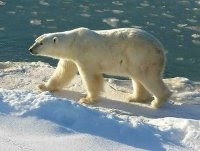Don't blow it - good planets are hard to find.

Modern technology
Owes ecology
An apology.
This part of the global issues web site attempts to highlight some of the environmental issues and concerns that have an affect on all of us — from what we do, to what we don’t do.
Biodiversity
The variety of life on Earth, its biological diversity, is commonly referred to as biodiversity. The number of species of plants, animals, and microorganisms, the enormous diversity of genes in these species, the different ecosystems on the planet, such as deserts, rainforests and coral reefs are all part of a biologically diverse Earth. Appropriate conservation and sustainable development strategies attempt to recognize this as being integral to any approach. In some way or form, almost all cultures have recognized the importance of nature and its biological diversity for their societies and have therefore understood the need to maintain it. Yet, power, greed and politics have affected the precarious balance.
Biodiversity boosts ecosystem productivity where each species, no matter how small, all have an important role to play.
And so, while we dominate this planet, we still need to preserve the diversity in wildlife.
Loss Of Biodiversity And Extinctions
It has long been feared that human activity is causing massive extinctions. Despite increased efforts at conservation, it has not been enough and biodiversity losses continue. The costs associated with deteriorating or vanishing ecosystems will be high. However, sustainable development and consumption would help avert ecological problems.
Nature And Animal Conservation
Yet, the pressures to destroy habitat for logging, illegal hunting, and other challenges are making conservation a struggle.
Climate Change Affects Biodiversity
Rapid global warming can affect an ecosystems chances to adapt naturally.
The Arctic is very sensitive to climate change and already seeing lots of changes. Ocean biodiversity is already being affected as are other parts of the ecosystem.
Coral Reefs
One type of ecosystem that perhaps is neglected more than any other is perhaps also the richest in biodiversity—the coral reefs.
Coral reefs are useful to the environment and to people in a number of ways. However, all around the world, much of the world’s marine biodiversity face threats from human and activities as well as natural. It is feared that very soon, many reefs could die off.
Addressing Biodiversity Loss
At the 1992 UN Conference on Environment and Development (the Earth Summit), the Convention on Biological Diversity (CBD) was born. 192 countries, plus the EU, are now Parties to that convention. In April 2002, the Parties to the Convention committed to significantly reduce the loss of biodiversity loss by 2010.
Perhaps predictably, that did not happen. Despite numerous successful conservations measures supporting biodiversity, the 2010 biodiversity target has not been met at the global level.
This recognizes that historically:
· Industrialized nations have emitted far more greenhouse gas emissions (even if some developing nations are only now increasing theirs);
· Rich countries therefore face the biggest responsibility and burden for action to address climate change; and
· Rich countries therefore must support developing nations adapt—through financing and technology transfer, for example.
This notion of climate justice is typically ignored by many rich nations and their mainstream media, making it easy to blame China, India and other developing countries for failures in climate change mitigation negotiations.
Development expert, Martin Khor, calculated that taking historical emissions into account, the rich countries owe a carbon debt because they have already used more than their fair quota of emissions.
Yet, by 2050 when certain emission reductions are needed by, their reduced emissions will still add up to be go over their fair share:
However, rather than continue down the path of unequal development, industrialized nations can help pay off their carbon debt by truly helping emerging countries develop along a cleaner path, such as through the promised-but-barely-delivered technology transfer, finance, and capacity building.
So far however, rich nations have done very little within the Kyoto protocol to reduce emissions by any meaningful amount, while they are all for negotiating a follow on treaty that brings more pressure to developing countries to agree to emissions targets.
In effect, the more there will be delay the more the poor nations will have to save the Earth with their sacrifices (and if it works, as history shows, the rich and powerful will find a way to rewrite history to claim they were the ones that saved the planet).
These issues are explored in more depth here.
Climate Change Flexibility Mechanisms
Flexibility mechanisms were defined in the Kyoto Protocol as different ways to achieve emissions reduction as part of the effort to address climate change issues. These fall into the following categories: Emissions Trading, Joint Implementation and Clean Development Mechanism.
However, these have been highly controversial as they were mainly included on strong US insistence and to keep the US in the treaty (even though the US eventually pulled out). Some of the mechanisms face criticism for not actually leading to a reduction in emissions, for example.
Image ©: Centre for Science and Environment
It seems there has been a recent interest in associating climate change/global warming with “over population” and that countries such as China and India have to do more to help contain global warming.
Yet rich countries have a lot to do themselves. There were agreed reasons why developing countries were exempt from initial greenhouse gas emission targets: it was the emissions from rich countries that accumulated in the atmosphere for so long to trigger climate change.







